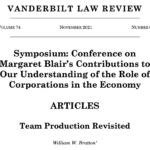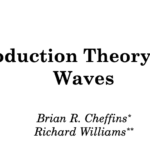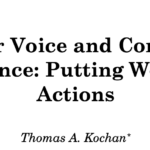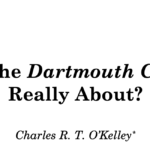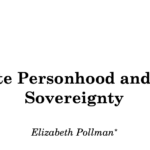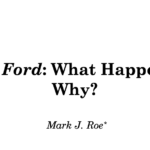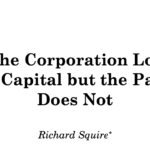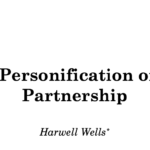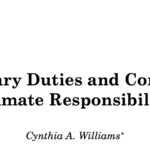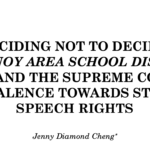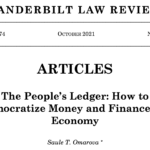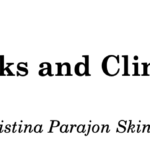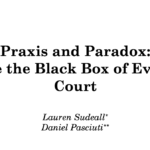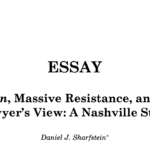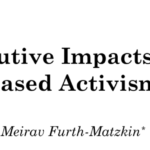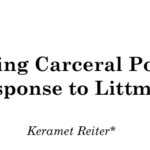Articles Category
Team Production Revisited
Nov. 24, 2021—William W. Bratton | 74 Vand. L. Rev. 1539 (2021) | This Article reconsiders Margaret Blair and Lynn Stout’s team production model of corporate law, offering a favorable evaluation. The model explains both the legal corporate entity and corporate governance institutions in microeconomic terms as the means to the end of encouraging investment, situating corporations within...
Team Production Theory Across the Waves
Nov. 24, 2021—Brian R. Cheffins & Richard Williams | 74 Vand. L. Rev. 1583 (2021) | Team production theory, which Margaret Blair developed in tandem with Lynn Stout, has had a major impact on corporate law scholarship. The team production model, however, has been applied sparingly outside the United States. This article, part of a symposium honoring Margaret...
Worker Voice and Corporate Governance: Putting Words into Actions
Nov. 24, 2021—Thomas A. Kochan | 74 Vand. L. Rev. 1625 (2021) | The encouraging news is that in 2019 the Business Roundtable recanted on its 1997 statement. Its members recognized that prioritizing shareholder value had gone too far; now they again endorsed the principle that a corporation should be held responsible for addressing the interests of not...
What Was the Dartmouth College Case Really About?
Nov. 24, 2021—Charles R. T. O’Kelley | 74 Vand. L. Rev. 1645 (2021) | In 1769, King George III issued a Royal Charter incorporating twelve persons as The Trustees of Dartmouth College with the right of self-perpetuation. The charter also identified one of the trustees, Eleazar Wheelock, as the founder and initial president of the corporation, with the right...
Corporate Personhood and Limited Sovereignty
Nov. 24, 2021—Elizabeth Pollman | 74 Vand. L. Rev. 1727 (2021) | This Article, written for a symposium celebrating the work of Professor Margaret Blair, examines how corporate rights jurisprudence helped to shape the corporate form in the United States during the nineteenth century. It argues that as the corporate form became popular because of the way it...
Dodge v. Ford: What Happened and Why?
Nov. 24, 2021—Mark J. Roe | 74 Vand. L. Rev. 1755 (2021) | Behind Henry Ford’s business decisions that led to the widely taught, famous-in-law-school Dodge v. Ford shareholder primacy decision were three industrial organization structures that put Ford in a difficult business position. First, Ford Motor had a highly profitable monopoly and needed much cash for the...
Why the Corporation Locks in Financial Capital but the Partnership Does Not
Nov. 24, 2021—Richard Squire | 74 Vand. L. Rev. 1787 (2021) | Each partner in an at-will partnership can obtain a cash payout of his interest at any time. The corporation, by contrast, locks in shareholder capital, denying general payout rights to shareholders unless the charter states otherwise. What explains this difference? This Article argues that partner payout...
The Personification of the Partnership
Nov. 24, 2021—Harwell Wells | 74 Vand. L. Rev. 1835 (2021) | What does it mean to say a business association is a legal person? The question has shadowed the law of business organizations for at least two centuries. When we say a business is a legal person we may be claiming that the law distinguishes its assets,...
Fiduciary Duties and Corporate Climate Responsibility
Nov. 24, 2021—Cynthia A. Williams | 74 Vand. L. Rev. 1875 (2021) | In this paper, I take up this question by reference to a public law issue much in focus today, that of climate change. In Part I, I provide an extremely brief overview of the understanding of climate risk as a financial risk, connecting that overview...
Deciding Not to Decide: Mahonoy Area School District v. B.L. and the Supreme Court’s Ambivalence Towards Student Speech Rights
Nov. 3, 2021—Jenny Diamond Cheng | 74 Vand. L. Rev. En Banc 511 (2021) | In June 2021, the Supreme Court issued opinions in its first school speech case in over fourteen years. In Mahanoy Area School District v. B.L., an eight-member majority held that high school officials violated a teenager’s First Amendment rights when they suspended...
The People’s Ledger: How to Democratize Money and Finance the Economy
Oct. 19, 2021—Saule T. Omarova | 74 Vand. L. Rev. 1301 (2021) | The COVID-19 crisis underscored the urgency of digitizing sovereign money and ensuring universal access to banking services. It pushed two related ideas—the issuance of central bank digital currency and the provision of retail deposit accounts by central banks—to the forefront of the public policy debate....
Central Banks and Climate Change
Oct. 19, 2021—Christina Parajon Skinner | 74 Vand. L. Rev. 1301 (2021) | Central banks are increasingly called upon to address climate change. Proposals for central bank action on climate change range from programs of “green” quantitative easing to increases in risk-based capital requirements meant to deter banks from lending to climate-unfriendly business. Politicians and academics alike have...
Praxis and Paradox: Inside the Black Box of Eviction Court
Oct. 19, 2021—Lauren Sudeall & Daniel Pasciuti | 74 Vand. L. Rev. 1365 (2021) | In the American legal system, we typically conceive of legal disputes as governed by specific rules and procedures, resolved in a formalized court setting, with lawyers shepherding both parties through an adversarial process involving the introduction of evidence and burdens of proof. The...
Brown, Massive Resistance, and the Lawyer’s View: A Nashville Story
Oct. 19, 2021—Daniel J. Sharfstein | 74 Vand. L. Rev. 1435 (2021) | For nearly 75 years, the Vanderbilt Law Review has sought to publish rigorous, intellectually honest scholarship. In publishing the following Essay, we seek to provide an equally unflinching look at one way in which Vanderbilt Law School and its graduates have participated in the creation...
The Distributive Impacts of Nudnik-based Activism
Sep. 10, 2021—Meirav Furth-Matzkin | 74 Vand. L. Rev. En Banc 469 (2021) | In Theory of the Nudnik: The Future of Consumer Activism and What We Can Do to Stop It, Professors Yonathan Arbel and Roy Shapira propose that nudnik customers should be lauded for acting as engines of market discipline. According to Arbel and Shapira,...
Remaking Carceral Policy: A Response to Littman
Sep. 10, 2021—Keramet Reiter | 74 Vand. L. Rev. En Banc 457 (2021) | Aaron Littman’s Jails, Sheriffs, and Carceral Policymaking marshals an immense amount of empirical data, drawn from a dizzying array of legal and policy sources, to reframe our thinking about what is and should be possible in criminal justice reform at the local level....
